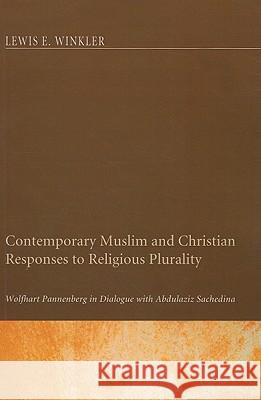Contemporary Muslim and Christian Responses to Religious Plurality » książka
Contemporary Muslim and Christian Responses to Religious Plurality
ISBN-13: 9781608997428 / Angielski / Miękka / 2011 / 352 str.
Contemporary Muslim and Christian Responses to Religious Plurality
ISBN-13: 9781608997428 / Angielski / Miękka / 2011 / 352 str.
(netto: 182,95 VAT: 5%)
Najniższa cena z 30 dni: 188,93
ok. 16-18 dni roboczych.
Darmowa dostawa!
In our rapidly changing and progressively globalized world, Christians and Muslims are faced with the prospect of directly encountering and responding to people of other faiths and cultures. This has pushed us all to address the vital question of how best to live with, work beside, and love one other as fellow citizens of our planet. Using resources from Christian theologian Wolfhart Pannenberg, Muslim ethicist Abdulaziz Sachedina, and several others, Winkler argues that we must continually dialogue with one another--not only about the beliefs and practices held in common between us, but also about the ways in which we are distinctively different. Only then can we take the opportunity more comprehensively to understand, appreciate, and cooperate with each other to build just, moral, and cohesive communities of hope in our often uncertain and unsettling times. --This book represents the way forward in interreligious dialogue. Its significance can be captured in two quotations. Winkler sums up Pannenberg's estimation of its importance as follows: '. . . interreligious dialogue is not merely missional, it is theologically essential for a truer and more comprehensive understanding of God's character and plans.' Muslim scholar Omid Safi indicates how dialogue engages significant interests: 'I don't want to --tolerate-- my fellow human beings but rather to engage them at the deepest level of what makes us human, through both our phenomenal commonality and our dazzling cultural differences.'-- --Nancey Murphy Professor of Christian Philosophy Fuller Theological Seminary --One of the greatest challenges of our day is how committed Muslims and Christians can live together harmoniously with increased contact through migration and burgeoning Muslim birth rates while conflicts are exacerbated by sensationalist media coverage of terrorism and wars. Though recognizing the problems, Lewis Winkler has discerned enough harmony in the views of a significant thinker from each community to suggest a potential bridge for cordial interaction for the rest of us over the troubled political and religious waters that engulf the globe we share.-- --J. Dudley Woodberry Dean Emeritus and Senior Professor of Islamic Studies Fuller Theological Seminary Lewis E. Winkler is a Lecturer in Theology, Church History, and Ethics at East Asia School of Theology in Singapore.
In our rapidly changing and progressively globalized world, Christians and Muslims are faced with the prospect of directly encountering and responding to people of other faiths and cultures. This has pushed us all to address the vital question of how best to live with, work beside, and love one other as fellow citizens of our planet. Using resources from Christian theologian Wolfhart Pannenberg, Muslim ethicist Abdulaziz Sachedina, and several others, Winkler argues that we must continually dialogue with one another--not only about the beliefs and practices held in common between us, but also about the ways in which we are distinctively different. Only then can we take the opportunity more comprehensively to understand, appreciate, and cooperate with each other to build just, moral, and cohesive communities of hope in our often uncertain and unsettling times.""This book represents the way forward in interreligious dialogue. Its significance can be captured in two quotations. Winkler sums up Pannenbergs estimation of its importance as follows: . . . interreligious dialogue is not merely missional, it is theologically essential for a truer and more comprehensive understanding of Gods character and plans. Muslim scholar Omid Safi indicates how dialogue engages significant interests: I dont want to ""tolerate"" my fellow human beings but rather to engage them at the deepest level of what makes us human, through both our phenomenal commonality and our dazzling cultural differences.""--Nancey MurphyProfessor of Christian PhilosophyFuller Theological Seminary""One of the greatest challenges of our day is how committed Muslims and Christians can live together harmoniously with increased contact through migration and burgeoning Muslim birth rates while conflicts are exacerbated by sensationalist media coverage of terrorism and wars. Though recognizing the problems, Lewis Winkler has discerned enough harmony in the views of a significant thinker from each community to suggest a potential bridge for cordial interaction for the rest of us over the troubled political and religious waters that engulf the globe we share.""--J. Dudley WoodberryDean Emeritus and Senior Professor of Islamic StudiesFuller Theological SeminaryLewis E. Winkler is a Lecturer in Theology, Church History, and Ethics at East Asia School of Theology in Singapore.











